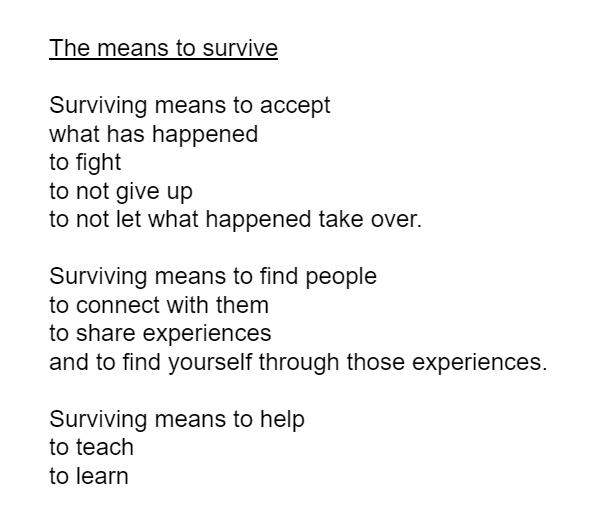
Throughout the semester, we have been learning about Audre Lorde and her many accomplishments. She is a black lesbian feminist; she dedicated her life and creative talent to confronting and bringing attention to the injustices of classism, racism, homophobia, and sexism. Lorde is a keystone for many women and helped them find who they are in their core. An example of how she inspires through her poetry from her time in Berlin is A Woman Speaks. Within the poem, there are many expressions that as her affirmations of worth and power, one of them being “my sisters/witches in Dahomey”. (20-21) Lorde is likening herself as a fierce woman warrior, which she is, but using a part of her history to identify as such. Lorde also sets herself apart without apology, “I am/ woman/ and not white” this is who she is, and she confidently knows this about herself. (32-4)
Lorde’s poem “A Litany for Survival,” depicts a world in which she was “never meant to survive.” As the poem suggests, she learns through the experience of fear and is able to speak out because “ it is better to speak/ remembering/ we were never meant to survive.” (42-44) Lorde continuously discovered lessons. In Zami a New Spelling of My Name, she learned to create a tribe “At the time, suffering was clearly what we did best. We became the branded because we learned how to make a virtue out of it”, in order to help each other. (82)The connections she makes with people help her grow and be able to never give up on herself through tough situations, the things that threatened her survival. In order to survive as a woman, Lorde faces an impasse after her mastectomy in The Cancer Journals when “The emphasis on wearing a prosthesis is a way of avoiding having women come to terms with their own pain and loss, and therapy, with their own strength”, to take the prosthetic and not come to terms of what happened or not take it and be able to move on in her life stronger for it. (49)
I choose to the creative option of our assignment and wrote a poem with Lorde’s lessons in mind:

Within this three-stanza poem, I express the lessons I have learned this semester with Audre Lorde. The first stanza, not giving up and keep fighting through the bleak situations you may find yourself in. All through The Cancer Journals, Lorde has to find the things that will help her instead of impeding her. Being confronted with a woman trying to convince Lorde that she will be more whole with a prosthetic, she knows that it will not give back what has been taken from her. She knows that in order to heal she needs to accept what has happened and be able to live without her missing breast, as she is a new person without it and this experience has brought new insight into her life and brought new wisdom.
In the second stanza, the lesson is connecting with others in order to learn about yourself. In Zami a New Spelling of My Name, This is a lesson that Lorde learned at a young age, “I met girls with whom I could share feelings and dreams and ideas without fear. I found adults who tolerated my feelings and ideas without punishment for insolence, and even a few who respected and admired them”, and even later in life when she created a tribe of women who supported her, it is these connections that let us differentiate whom we are compared to others. (82) As no two people are the same, it is important that we see this and find the people that we want in our lives and the ones we do not.
The final stanza is a lesson that I find to be the most important. As much as Lorde is a poet and essayist, she is also a fantastic teacher. In her essay Poet as Teacher, there is no difference between a poet and a teacher, “A writer by definition is a teacher. Whether or not I ever teach another class, every poem I create is an attempt at a piece of truth formed from the images of my experience shared with as many people as can or will hear me”, as you learn more about yourself you are able to teach others through your experiences. As a poet Lorde is able to connect with so many people teach the lessons she learned through her experiences to help whoever reads her writings.
Works Cited
LORDE, AUDRE. CANCER JOURNALS. PENGUIN Books, 2020.
Lorde, Audre. “A Litany for Survival by Audre Lorde.” Poetry Foundation, Poetry Foundation, www.poetryfoundation.org/poems/147275/a-litany-for-survival.
Lorde, Audre. “A Woman Speaks by Audre Lorde.” Poetry Foundation, Poetry Foundation, www.poetryfoundation.org/poems/42583/a-woman-speaks.
Lorde, Audre. Zami, a New Spelling of My Name: a Biomythography. Crossing Press, 1996.“Lorde_Poet As Teacher (1).Pdf.” Google Drive, Google, drive.google.com/file/d/141MluaBpTmvmmRT4vLzFzDIdMvsS_YXP/view.
